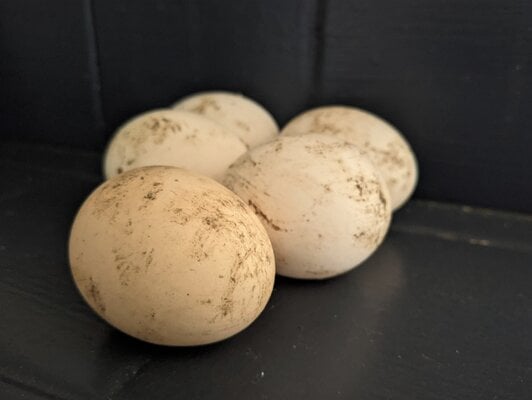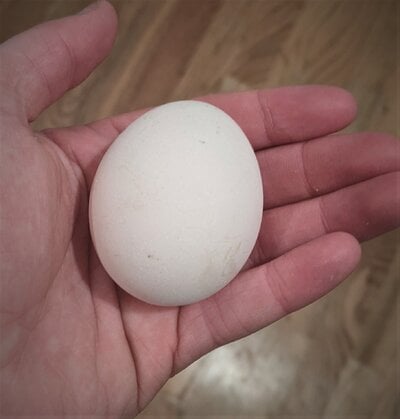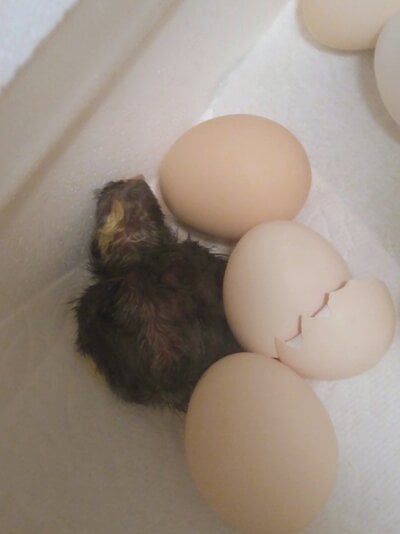Why are all the eggs coming from your coop dirty? The hens aren't laying on the floor, so what's the problem?
You're not alone. I, along with many other chicken keepers, have wondered this same thing at one point or another. From my experience, here are the top three reasons your eggs are looking gross.

1. Dirty bedding in the nesting box
Hens need clean bedding to lay eggs in comfort. Pine shavings and straw are the most popular options. The hens will arrange the little pieces to form a cavity in the bedding to help them fit all the eggs under them. They like to do this whenever they lay an egg, but it is especially important if a broody hen is hatching eggs.
Over time, little bits of poop and mud and who-knows-what-else will track their way into the nesting box. When it starts to look uncomfortable, it’s time to clean it out and replace the bedding.
I clean out my nesting boxes at least twice as often as my coop floor! There is no rule to how clean the nesting box must be, just use your best judgment and decide when it is time for new bedding.
2. Hens pooping in the nesting box
There are two types of nest pooping; when the hens sleep in the box and when they sit on the rim. Whichever it is, try to figure out the why.
Is there not enough space on the roost, or is another hen hogging it? You may need to set up another one.
Is there a draft blowing across the roosts? You want good ventilation in the coop, but not drafts. Especially in winter.
Is the nesting box higher than the roost? A chicken's instincts tell them to sleep high up at night to avoid ground predators. If the nesting boxes are placed higher up or level with the roosts then they will likely try to sleep up there.
Do they prefer sleeping in the bedding over perching on the roost? This is often the case with young chickens who are still adapting to coop life. Some people train chicks with little roosts in the brooder to practice sleeping on.
Young birds, chickens with clipped wings, and silkies might not be able to reach the perch, or are too lazy to put in the effort to fly up. You might want to lower the roost or add a new one.
Do they not like the roost shape or placement? Do they simply prefer the nesting boxes? Sometimes changing your coop style will be enough, and other times they will stubbornly stick with the nesting boxes.
Solutions will vary by the coop, chickens, and flock management. You may have to discover your own answers. Some other suggestions are: closing off access to the nesting boxes at night, moving them from the box to the roost every night until they learn (or not), or surrendering and cleaning out the nesting boxes regularly.
Keep in mind, voluntarily sleeping in the nesting box is different from broody hen habits. A broody hen stays in her nest all day and only gets up once or twice to eat, drink, and poop. Yes, that's right! Broody hens have the instinct to hold in their feces until they get off the nest. This is why the droppings right outside the nesting box of a mama hen are extra large.
3. Muddy ground outside the coop
One spring I kept having dirty eggs. I couldn’t figure out why! Their bedding was clean and everyone was sleeping on their roosts. Finally, I realized that the hens’ feet were rubbing mud on the eggs!
Thankfully, the solution to this problem is simple! Spread fallen leaves, mulch, straw, or anything else you can find all over the ground outside the chicken coop. Sometimes you have to do this several times during the rainy season. This keeps the mud down and the chickens’ feet cleaner.
Of course, you could always get a covered run. But, depending on your materials and location, that might not be as cheap.

Why should you care?
Clean, unwashed eggs will last for a long time, in or out of the fridge. This is because there is an egg bloom on the shell which keeps out bacteria.
Dirty eggs, whether you wash them or not, are vulnerable to unhealthy bacteria and therefore rot. I did an experiment and found that washed eggs kept outside the fridge took exactly two weeks to rot!
Besides this, it is unpleasant to crack and eat a poopy egg. And if you sell some eggs, nobody likes them dirty.
If you want to hatch chicks, clean shells will keep the eggs from spreading bad bacteria around and rotting.

So there you have it! Of course, there are many more reasons your eggs could be dirty, but these are the top 3 problems I’ve dealt with the most.
I also recommend looking into this article on cleaning and storing your eggs!
What dirty egg problems have you had? Solutions? Please comment and share your stories!
You're not alone. I, along with many other chicken keepers, have wondered this same thing at one point or another. From my experience, here are the top three reasons your eggs are looking gross.

1. Dirty bedding in the nesting box
Hens need clean bedding to lay eggs in comfort. Pine shavings and straw are the most popular options. The hens will arrange the little pieces to form a cavity in the bedding to help them fit all the eggs under them. They like to do this whenever they lay an egg, but it is especially important if a broody hen is hatching eggs.
Over time, little bits of poop and mud and who-knows-what-else will track their way into the nesting box. When it starts to look uncomfortable, it’s time to clean it out and replace the bedding.
I clean out my nesting boxes at least twice as often as my coop floor! There is no rule to how clean the nesting box must be, just use your best judgment and decide when it is time for new bedding.
2. Hens pooping in the nesting box
There are two types of nest pooping; when the hens sleep in the box and when they sit on the rim. Whichever it is, try to figure out the why.
Is there not enough space on the roost, or is another hen hogging it? You may need to set up another one.
Is there a draft blowing across the roosts? You want good ventilation in the coop, but not drafts. Especially in winter.
Is the nesting box higher than the roost? A chicken's instincts tell them to sleep high up at night to avoid ground predators. If the nesting boxes are placed higher up or level with the roosts then they will likely try to sleep up there.
Do they prefer sleeping in the bedding over perching on the roost? This is often the case with young chickens who are still adapting to coop life. Some people train chicks with little roosts in the brooder to practice sleeping on.
Young birds, chickens with clipped wings, and silkies might not be able to reach the perch, or are too lazy to put in the effort to fly up. You might want to lower the roost or add a new one.
Do they not like the roost shape or placement? Do they simply prefer the nesting boxes? Sometimes changing your coop style will be enough, and other times they will stubbornly stick with the nesting boxes.
Solutions will vary by the coop, chickens, and flock management. You may have to discover your own answers. Some other suggestions are: closing off access to the nesting boxes at night, moving them from the box to the roost every night until they learn (or not), or surrendering and cleaning out the nesting boxes regularly.
Keep in mind, voluntarily sleeping in the nesting box is different from broody hen habits. A broody hen stays in her nest all day and only gets up once or twice to eat, drink, and poop. Yes, that's right! Broody hens have the instinct to hold in their feces until they get off the nest. This is why the droppings right outside the nesting box of a mama hen are extra large.
3. Muddy ground outside the coop
One spring I kept having dirty eggs. I couldn’t figure out why! Their bedding was clean and everyone was sleeping on their roosts. Finally, I realized that the hens’ feet were rubbing mud on the eggs!
Thankfully, the solution to this problem is simple! Spread fallen leaves, mulch, straw, or anything else you can find all over the ground outside the chicken coop. Sometimes you have to do this several times during the rainy season. This keeps the mud down and the chickens’ feet cleaner.
Of course, you could always get a covered run. But, depending on your materials and location, that might not be as cheap.

Why should you care?
Clean, unwashed eggs will last for a long time, in or out of the fridge. This is because there is an egg bloom on the shell which keeps out bacteria.
Dirty eggs, whether you wash them or not, are vulnerable to unhealthy bacteria and therefore rot. I did an experiment and found that washed eggs kept outside the fridge took exactly two weeks to rot!
Besides this, it is unpleasant to crack and eat a poopy egg. And if you sell some eggs, nobody likes them dirty.
If you want to hatch chicks, clean shells will keep the eggs from spreading bad bacteria around and rotting.

So there you have it! Of course, there are many more reasons your eggs could be dirty, but these are the top 3 problems I’ve dealt with the most.
I also recommend looking into this article on cleaning and storing your eggs!
What dirty egg problems have you had? Solutions? Please comment and share your stories!

